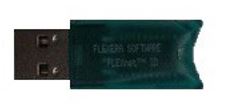Installing a new FLEXid=9 USB keylock and drivers - Obsolete
NOTE: FLEXid=9 dongles are no longer supported by the latest FLEXlm software for Aldec Products. Please contact customercare@aldec.com for further help.
NOTE: For Flex-10 dongles, please visit: https://www.aldec.com/en/support/resources/documentation/articles/2192
If your Active-HDL, Riviera-PRO, ALINT, HES/DVM or Netlist Converter license is issued for a USB FLEXid keylock or dongle (license file contains reference to "flexid=9" in the server line), installing the drivers may be necessary. Read Verifying Driver Installation below to check if you need to install the driver.
NOTE: USB FLEXid keylocks are labeled with a FLEXid number, in the format FLEXid=9-xxxxxxxx, where x is a hexadecimal number. The FLEXid=9 (HASP) keylock is green as shown below:

Figure 1 USB keylock
Drivers
Note for Active-HDL 11.1 users: Download the drivers from this page: https://www.aldec.com/en/support/resources/documentation/faq/1783.
Drivers can be obtained from the following locations:
Platform |
FLEXid |
Download Location |
Red Hat® and SUSE® Linux 32/64-bit |
9 |
Obsolete: https://www.aldec.com/en/downloads/5700 |
Debian, Ubuntu, and CentOS Linux 32/64-bit |
9 |
Obsolete: https://www.aldec.com/en/downloads/5714 |
Microsoft® Windows® 32 bit |
9 |
Obsolete: https://www.aldec.com/en/downloads/5727 |
Microsoft® Windows® 64 bit |
9 |
Obsolete: https://www.aldec.com/en/downloads/5728 |
NOTE: Please refer to fnpdig.pdf located under https://www.aldec.com/en/downloads/9534 for installation instructions.
Windows
FLEXID9 (Green)
Windows 10
Open a command prompt (cmd.exe) and navigate to the extracted flexid driver folder
64-bit
Copy "haspsrm_win64.dll" to %windir%/System32
Copy "haspsrm_win32.dll" to %windir%/SysWOW64
32-bit
Copy "haspsrm_win32.dll" to %windir%/System32
Execute command: haspdinst -i
Windows 7
Right-click the install script (Install.bat) and select "Run as administrator"
If the dongle is still not recognized
64-bit
Copy "haspsrm_win64.dll" to %windir%/System32
Copy "haspsrm_win32.dll" to %windir%/SysWOW64
32-bit
Copy "haspsrm_win32.dll" to %windir%/System32
Linux
(64-bit) - Place libhasp_linux_x86_64.so into /usr/lib
(32-bit) - Place libhasp_linux_i686.so into /usr/lib
FLEXID9 (Green)
Debian, Ubuntu, CentOS
64-bit and 32-bit
tar -xzvf Sentinel_LDK_Linux_Run-time_Installer_script.tar.gz
tar -xzvf aksusbd-2.2.1-i386.tar.gz
./dinst
RedHat, SUSE
64-bit and 32-bit
tar -xzvf aksusbd-redhat-suse-2.5.1.tar.gz
rpm -i aksusbd-2.5.1.i386.rpm
Verifying Driver Installation
To verify the driver installation on Linux or Windows, invoke the lmutil program with the following parameters:
./lmutil lmhostid -flexid
If the driver is installed correctly you should see the message as shown below: The FLEXlm host ID of this machine is "FLEXID=9-a2b2c845".
The lmutil tool can be found when you download the License Daemon that corresponds to your machine:
Windows
Windows 32-bit: https://www.aldec.com/en/downloads/5732
Windows 64-bit: https://www.aldec.com/en/downloads/5733
Linux
Linux 32-bit: https://www.aldec.com/en/downloads/5729
Linux 64-bit: https://www.aldec.com/en/downloads/5730
Unix - 32 bit:
Corporate Headquarters
2260 Corporate Circle
Henderson, NV 89074 USA
Tel: +1 702 990 4400
Fax: +1 702 990 4414
https://www.aldec.com
©2026 Aldec, Inc.
